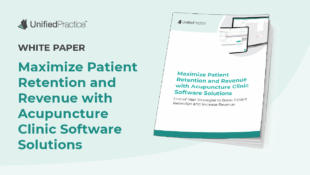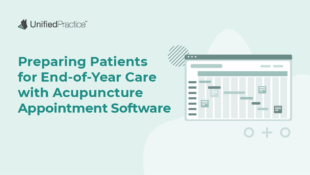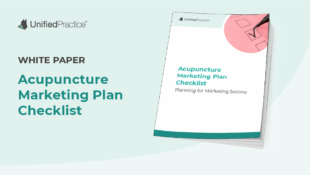We created Clinic Spotlight to share real-world examples of TCM clinics working to grow their business and improve their patients’ experiences.
The following interview is with acupuncture practitioner Elizabeth Collins. She operates an integrated health care center in Providence, Rhode Island, and streamlines her practice using Unified Practice’s acupuncture practice management software.
What are some of the key things you’ve done or developed to improve the business side of your clinic?
Expanding, adding a second room, and being able to take care of more people. At times you would think that would make things more challenging but it hasn’t. It’s been—knock on wood—really easy.
And honestly, probably getting Unified Practice. It really helped streamline everything. There’s a lot less for me to keep track of because I’m no longer trying to function on multiple platforms. I don’t have to work with a separate scheduling platform. My billing is all in one place. Its easy and user-friendly.
What are the key lessons that have transformed the way you practice or work with your patients?
Being humble. Not getting too cocky. That’s a big one for me.
And not throwing anything out the window. I’m a pretty integrated practitioner. I do a lot with dietary therapy. I make an effort to utilize the modalities to which I have access. That’s made a huge difference in my patient outcomes. They tend to be better because I’m not limiting myself just to acupuncture or just to herbs. I have colleagues who get great results utilizing one modality but that doesn’t seem to work quite as well for me.
What are the most challenging aspects of running or growing your acupuncture practice and how did you overcome them?
One of the biggest is getting people through the door. A lot of that has to do with reputation. It is especially challenging in Rhode Island because it is like a big small town. Everybody knows everybody else and if you’re an outsider—as I was when I moved here—literally nobody knows you. My brother was in the Boston area and that was the closest connection I had to Providence.
But when they get to know you, Rhode Islanders are the most fiercely loyal people I’ve ever met in my life. My patients are incredible. It was only halfway through my third year of practice this past year that I started comfortably seeing enough people to sustain myself without having to have some sort of second job.
A lot of that came from networking with other acupuncturists. Some of my friends who have been in practice for a long time either are not seeing new patients or just don’t have enough space, so they would send me overflow. Making good connections within the practice community really helped me get things off the ground.
Secondly, insurance billing has been a fun adventure. That’s been a lot of trial and error and time on the phone. There wasn’t an easy way to avoid putting in the time, but that’s fine because I actually know the process now. I’m at the point of hiring a biller to do it for me and I can be confident in the people I’m hiring. I know how to vet somebody better than I would have if I had never tried to tackle it myself.
What are some mistakes you made along the way?
One of the biggest mistakes was trying to do everything myself. It’s not necessarily a bad thing, because it has been a good learning curve. But if there’s any place where you can get help and find people who are willing to help you—take it! It’s a very lonely road and it’s not something you have to do all by yourself. Nobody ever told me that was the case.
Another mistake was not taking payments through insurance. I had a fear around that because I was afraid of not getting paid quickly enough (and that’s certainly an issue). But it makes treatment a lot more accessible for patients. If somebody has insurance they’re a lot more likely to come in because it’s less of a financial burden. I also find that insured patients tend to be a little more proactive. They might come in once a month for a maintenance visit and that keeps them from getting sick or injured.
Another thing—I hate networking. I’m such an introvert. But networking can be really useful. I haven’t done enough of that as a practitioner because I’m socially awkward. I connect with people once I’m there and talking, but the initial fear of getting past that has kept me out of situations that probably would have benefitted me as a practitioner.
What advice would you give a practitioner that is just starting their clinic?
#1:
Join your state association and make friends with other acupuncturists. We’re a small profession and we really need to stick together. When I initially came into this I was nervous about reaching out to other people in the acupuncture community. As a new person coming in, and Rhode Island being such a small state, I was worried about competition, if people were going to be nice. It couldn’t have worked out better. Everybody who is a practitioner here is really lovely. I’m the vice-president of my state association and its been great to have the opportunity to make connections, to be able to talk about the frustrations of owning a business. If I get hung up on something or I’m treating somebody and it’s not going well I have a network of people I can call and say “I’m struggling with this—can you help me?”
#2:
Know your limits. I don’t work with pediatrics, but my very dear friend does. She’s great with kids. She came down and started her business around the same time I did, so it’s nice to be able to support her. And likewise she’s sent people to me. For example, she wasn’t having any traction with one patient. She knows I specialise in orthopedics—this patient had back pain—so she said, “I’m not getting anywhere—can you help me?”
#3:
I would really encourage practitioners to participate beyond just getting a patient on the table, putting needles in them, and then sending them on their way.
There’s a lot of activity happening now in trying to get acupuncture covered by insurance companies. I never anticipated being a political person in any capacity—and certainly not in my profession—but I found it to be one of the most fulfilling things I’ve had the opportunity to do. There are a lot of ways to engage with our profession in really proactive ways that gets information out to more people so they can utilise it to create a wider client base.
#4:
Have a side hustle to get started. I bartended and what not for a couple of years. I did that primarily full-time when I first moved up to Rhode Island because I didn’t have any patients. It helped me immensely because I didn’t have to worry as much. You know—how many patients do I have to see this week? How am I going to eat? How am I going to buy cat food?
What aspect of the work do you enjoy the most?
When somebody honestly tells me that they feel good enough that they don’t have to come in again. Then I know I’ve done my job. It seems counter-intuitive because I want to have a busy practice but my job is to make people better.
I got an email from a patient recently who has been struggling with an orthopedic issue and he is now feeling well enough that he can go back to doing some of the activities he hasn’t been able to do for a long time. That made me feel really good.
*
We thank Elizabeth Collins for taking the time to participate in our Clinic Spotlight series and we wish her continued success.
Stay tuned for more Clinic Spotlight interviews where we’ll discuss what lessons, tactics, and marketing tools other clinics are using to grow their TCM and acupuncture practices.
For more information about Unified Practice and our acupuncture practice management and EHR software visit our website. To learn more about the benefits of electronic medical records and our TCM practice management solutions please see https://www.unifiedpractice.com/blog/.
[Interviewer: Matthew Leask]




